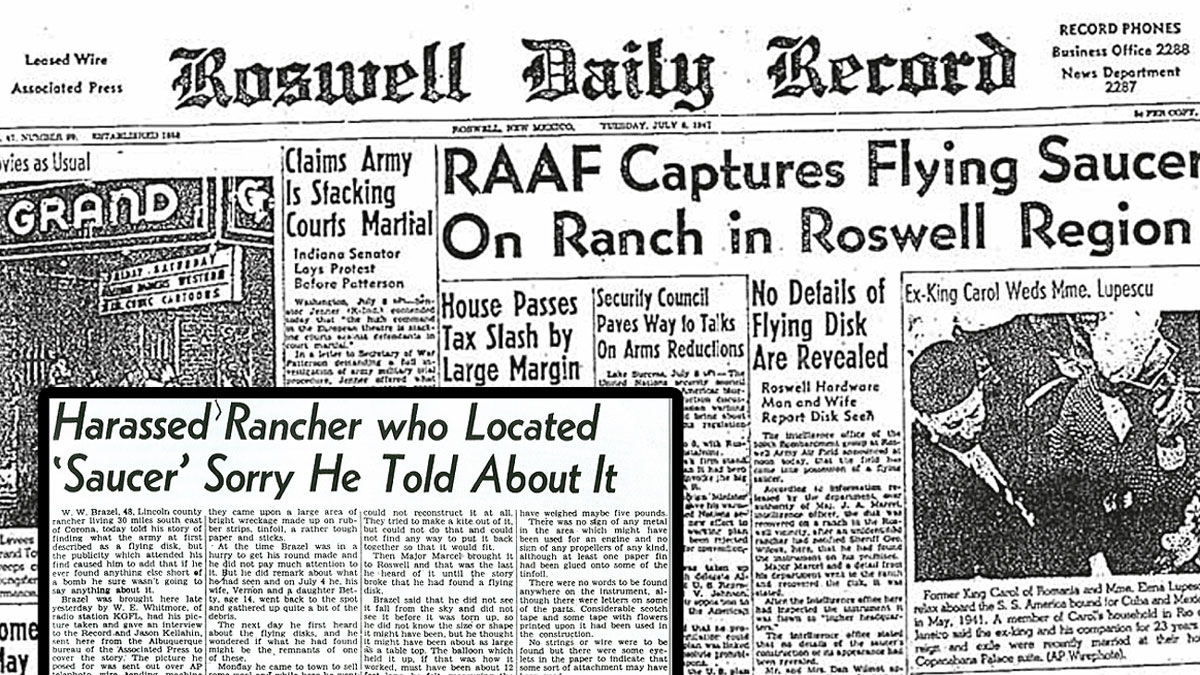THE ‘ROSWELL INCIDENT’ CONSPIRACY IS NONSENSE

Next month will mark the 70th anniversary of a notorious episode known as the “Roswell incident.”
In July 1947 — at a remote site northwest of Roswell, New Mexico — a county ranger named Mac Brazel came across strange looking debris in a field where he regularly grazed his sheep.
Brazel was unable to identify the strange wreckage, so he summoned the local sheriff. Equally mystified, the sheriff contacted the local Roswell Army Airbase.
Within hours, dozens of soldiers were dispatched to the site, where they collected every fragment of Brazel’s enigmatic find, and spirited it away in armored trucks.
The following day, the Army announced that the soldiers had recovered the wreckage of a weather balloon that had crashed into the field. Evidently, this was a cover story; in reality, the airborne apparatus that had smashed into the ground was part of a short-lived top-secret military project called Project Mogul, which was created to detect sound waves generated by Soviet atomic bomb tests.
At the time, the Army cover-story sufficed — despite Brazel’s insistence that what he saw in the field was certainly not a weather balloon.
But fast-forward to the late 1970s, and the Roswell story had exploded into a major conspiracy theory, with ufologists postulating that the debris had been wreckage from an alien ‘flying saucer’ that had crashed — along with a crew of aliens, whose bodies had been recovered from the site and hidden away so that the public would never find out the truth.
This unlikely story evolved and gained a life of its own, eventually becoming a staple of sensationalist TV shows and sci-fi series.
Recently, as the 70th anniversary has loomed, ‘news’ stories about Roswell have been coming out thick and fast.
In one recent story, it was ‘revealed’ that a leaked Defense Intelligence Agency report had ‘confirmed’ that the debris at Roswell was from a crashed UFO, that dead aliens had been found at Roswell, and that there was a carefully planned government cover-up.
A second recent story asserted that an alleged former CIA agent had made a filmed deathbed confession in which he stated that he saw an extra-terrestrial who survived Roswell being interrogated by government operatives.
The thing is — most people don’t believe any of this, nor, for that matter, do we entertain the claims of those who maintain that the Apollo moon landings were all an elaborate hoax, or that Denver International Airport stands above an underground city that serves as a headquarters for the masonically-inspired New World Order.
It’s not that any of these conspiracy stories can be categorically disproved, but we feel they do not need to be. The question is: why would any intelligent person believe such nonsense to be true?
In the Torah portion of Korach, we are confronted with the story of a revolutionary movement against Moses and Aaron — Korach and his supporters demanded a greater role in the leadership of Israel.
On the face of it, this revolt was not that surprising. Korach was a prominent figure who felt excluded, as did his co-conspirators from the tribe of Reuben, whom had clearly been relegated to an inferior position in the national pecking order.
And then there were the 250 princes who felt marginalized, inevitably resulting in their discontent.
Accordingly, it is understandable that all of those involved in Korach’s insurrection would challenge the hierarchy at some point. Nevertheless, the medieval commentator Rashi dismisses Korach and his co-conspirators, even as he acknowledges Korach’s intelligence: “Korach was astute; how was it possible that he engaged in this foolishness?”
The Jerusalem Talmud teaches that Korach was guilty of two foundational theological crimes: he denied the prophetic uniqueness of Moses, and he repudiated the divine origin of the Torah.
Maimonides says that any Jew who denies the authority of Moses’ prophecy or the Torah’s divine origins could not possibly have been present at Mount Sinai. This assertion seems contradicted by the story of Korach, who must certainly have been present at Mount Sinai.
Maimonides’ statement also seems to remove freedom of choice as an option when it comes to this claim.
Rabbi Eliyahu Dessler (1892-1953), in his fascinating Jewish Ethics masterpiece, Michtav M’Eliyahu, suggests that every person has his or her “nekudat bechira” — “point of free will”. Theoretically, we could all wake up one morning and decide that the world is flat, or that a UFO piloted by aliens crashed at Roswell — but we don’t.
Of course, we have the freedom to believe anything we want, but when we choose not to believe in Roswell, or in moon landing hoax stories, it is not connected to our freedom of choice.
Instead, our personal “point of free will” might relate to choosing to be properly Shabbat observant, or ensuring that we attend daily prayers, or observing proper kosher food standards — and our goal must be to constantly move our “point” in a direction of growth and improvement.
Maimonides is not suggesting that choice is not an option when it comes to believing that Moses was Judaism’s most elevated prophet or other principles of Judaism. Rather, he is informing us that if someone’s personal “point of free will” falls in an area of doubt on these principles, that person has clearly opted out of the nation that stood at the foot of Mount Sinai, headed to the fringes, and embraced a Roswell-type narrative that rejects the theology norms that regular Jews know to be true.
Korach and his group of supporters had inexplicably abandoned self-evident truths, and became believers in the biblical equivalent of Roswell. That they did so should remind us all that the option of Torah-rejection is a real possibility, even for intelligent people, and that it is no different from believing that aliens from outer space crash-landed at Roswell in 1947.

